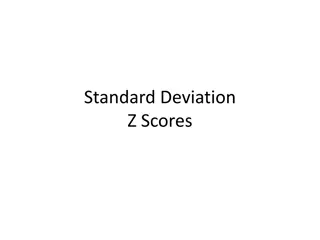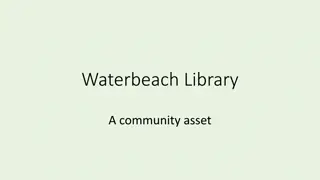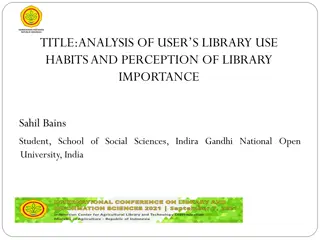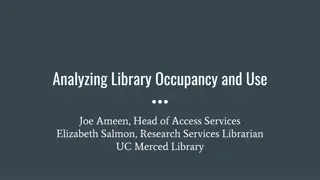
Exploring Standard C Library Functions in C Programming
Dive into the essential functions provided by the Standard C Library in C programming, covering topics such as type definitions, variable declarations, constants, and macro definitions. Discover how to utilize these functions effectively for various programming tasks. Learn about popular header files like stdio.h, stdlib.h, ctype.h, and more, and enhance your understanding of C programming with detailed usage information available in the man pages and online resources.
Download Presentation

Please find below an Image/Link to download the presentation.
The content on the website is provided AS IS for your information and personal use only. It may not be sold, licensed, or shared on other websites without obtaining consent from the author. If you encounter any issues during the download, it is possible that the publisher has removed the file from their server.
You are allowed to download the files provided on this website for personal or commercial use, subject to the condition that they are used lawfully. All files are the property of their respective owners.
The content on the website is provided AS IS for your information and personal use only. It may not be sold, licensed, or shared on other websites without obtaining consent from the author.
E N D
Presentation Transcript
CSC215 Lecture Standard Library in C
Outline Introduction stdio.h stdlib.h ctype.h stdarg.h math.h string.h assert.h errno.h time.h
Introduction Standard library: type definitions variable declarations constant and macro definitions functions Description and usage information can be obtained from man pages on unix-like OS or the web section 3 on unix and unix-like OS: in the terminal type: man [<section>] <library_function_name> Many websites host copies of the man pages: Die, HE , MAN7 , Listof standard library header files: assert.h ctype.h errno.h float.h setjmp.h signal.h stdarg.h stddef.h stdio.h limits.h locale.h math.h stdlib.h string.h time.h
Library stdio.h Types Functions FILE *fopen(const char *, const char *) int fclose(FILE *) int fflush(FILE *) -------------------- int getchar(void) char *gets(char *) int scanf(const char *, ...) int putchar(int char) int puts(const char *) int printf(const char *, ...) ---------------------------------------------------- int fgetc(FILE *) int ungetc(int char, FILE *stream) char *fgets(char *, int , FILE *) int fscanf(FILE *, const char *, ...) int fputc(int, FILE *) int fputs(const char *, FILE *) int fprintf(FILE *, const char *, ...) ---------------------------------------------------- size_t FILE -------------------------------- Constants NULL EOF SEEK_CUR SEEK_END SEEK_SET stderr stdin stdout
Library stdio.h Functions (cont.) size_t fread(void *, size_t, size_t, FILE *) size_t fwrite(const void *, size_t, size_t, FILE *) ---------------------------------------------------- void rewind(FILE *) int fseek(FILE *, long int, int) int fgetpos(FILE *, fpos_t *) int fsetpos(FILE *, const fpos_t *) long int ftell(FILE *) ---------------------------------------------------- int remove(const char *) int rename(const char *, const char *) ----------------------------------------------------
Library stdlib.h Types Functions (cont.) void *malloc(size_t) void *calloc(size_t, size_t) void *realloc(void *, size_t) void free(void *) ---------------------------------------------------- double atof(const char *) int atoi(const char *) long int atol(const char *) double strtod(const char *, char **) long int strtol(const char *, char **, int) unsigned long int strtoul(const char *, char **, int) ---------------------------------------------------- void abort(void) void exit(int) int atexit(void (*func)(void)) int system(const char *string) ---------------------------------------------------- int abs(int x) long int labs(long int x) size_t Constants NULL EXIT_FAILURE EXIT_SUCCESS RAND_MAX
Library stdlib.h Functions (cont.) int rand(void) void srand(unsigned int seed) void *bsearch(const void*,const void*,size_t,size_t,int(*compar)(const void*,const void*)) void qsort(void *, size_t, size_t, int (*compar)(const void *, const void*)) #include <stdio.h> #include <stdlib.h> #include <string.h> int main(){ int count = 10; Book books[] = {{"The Adventures of Duck and Goose" , 10.99}, {"The Return of Duck and Goose" , 19.99}, {"More Fun with Duck and Goose" , 12.99}, {"Duck and Goose on Holiday" , 11.99}, {"The Return of Duck and Goose" , 19.99}, {"The Adventures of Duck and Goose" , 18.99}, {"My Friend is a Duck" , 14.99}, {"Annotated Notes on the Duck and Goose chronicles", 8.99}, {"Duck and Goose Cheat Sheet for Students" , 5.99}, {"Duck and Goose: an allegory for modern times?" , 59.99}}; /* descending order by title, */ qsort(books, count, sizeof(Book), title_desc); print_list(books, count); /* ascending order by price, */ qsort(books, count, sizeof(Book), price_asc); print_list(books, count); /* search for a book that is priced at 10.99 */ Book key = {"", 10.99}; Book* result = bsearch(&key, books, count, sizeof(Book), price_asc); printf("%s\n", result?result->title:"Not found"); return 0; } typedef struct{ char title[200]; float price; } Book; int i; int title_desc(const void* a, const void* b){ return strcmp(((Book*)b)->title, ((Book*)a)->title); } int price_asc(const void* a, const void* b){ return ((Book*)a)->price - ((Book*)b)->price; } void print_list(Book* list, int count){ for (i=0; i < count; i++) printf("%-20.15s %6.2f\n", list[i].title, list[i].price); puts("*********************"); }
Library ctype.h Functions (cont.) int isalnum(int c) int isalpha(int c) int iscntrl(int c) int isdigit(int c) int isgraph(int c) int islower(int c) int isprint(int c) int ispunct(int c) int isspace(int c) int isupper(int c) int isxdigit(int c) ------------------- int tolower(int c) int toupper(int c) Graphical characters Hexadecimal Digits 0 1 2 3 4 5 6 7 8 9 Alphabetic A B C D E F G H I J K L M N O P Q R S T U V W X Y Z Uppercase Letters Printable a b c d e f g h i j k l m n o p q r s t u v w x y z Lowercase Letters ! " # $ % & ' ( ) * + , - . / : ; < = > ? @ [ \ ] ^ _ ` { | } ~ Punctuations ' ' \t \n \v \f \r Space characters \0 \007 \177 Control characters
Library stdarg.h Types va_list Macros void va_start(va_list, last_arg) type va_arg(va_list, type) void va_end(va_list) void va_copy(va_list, va_list)
Optional Parameters C permits functions to have optional parameters Syntax: <returntype> <name>(<paramslist>, ) indicates that further parameters can be passed, must be listed only after the required parameters since you specify the parameters as , you do not know their names! How to use these additional parameters when they are passed? stdarg.h file contains the definition of va_list (variable argument list) declare a variable of type va_list use the macro va_start which initializes your variable to the first of the optional params use the function va_arg which returns the next argument
Optional Parameters Example: #include <stdarg.h> #include <stdio.h> int sum(int, ...); int main(){ printf("Sum of 15 and 56 = %d\n", sum(2, 15, 56) ); return 0; } int sum(int num_args, ...){ int val = 0; va_list ap; int i; va_start(ap, num_args); for(i = 0; i < num_args; i++) val += va_arg(ap, int); va_end(ap); return val; }
Library math.h Arithmetic functions double fabs(double ) double ceil(double ) double floor(double ) double fmod(double , double ) double modf(double , double *) Exponential functions double pow(double , double ) double sqrt(double ) double exp(double ) double ldexp(double , int ) double log(double ) double log10(double ) Trigonometric functions double sin(double ) double cos(double ) double asin(double ) double acos(double ) double atan(double ) All functions take and yields double precision floating point values. |x| x x x%y x- x , x Trigonometric functions deals with input and output angles in radians. xy x ex x.2y logex log10x sin(x) cos(x) sin-1(x) cos-1(x) tan-1(x)
Example #include <stdio.h> #include <math.h> const double PI = acos(-1); const double E = exp(1); int main(){ double buf; printf("pi = %f\n", PI); printf("e = %f\n", E); pi = 3.141593 e = 2.718282 Absolute: |-1.300000| = 1.300000 Floor: -1.300000 >= -2.000000 Ceiling: -1.300000 <= -1.000000 F Mod: 18.900000 mod 9.200000 = 1.500000 Split: 427.049000 into 0.049000 and 427.000000 Floor: -1.300000 >= 1.000000 = printf("Absolute: |%f| = %f \n", -1.3, fabs(-1.3)); printf("Floor: %f >= %f\n", -1.3, floor(-1.3)); printf("Ceiling: %f <= %f\n", -1.3, ceil(-1.3)); printf("F Mod: %f mod %f = %f\n", 18.9, 9.2, fmod(19.9, 9.2)); printf("Split: %f into %f and ", 427.049, modf(427.049, &buf)); printf("%f\n", buf); printf("Floor: %f >= %f = \n", -1.3, floor(1.0/3+1.0/3+1.0/3)); Fifth root of : 1.300000 is 1.053874 Square root of : 112.700000 is 10.616026 5.200000x2^7 = 665.600000 Loge 5.200000 = Loge 10 x Log10 5.200000 1.648659 = 2.302585 x 0.716003 printf("Fifth root of : %f is %f\n", 1.3, pow(1.3, 1.0/5)); printf("Square root of : %f is %f\n", 112.7, sqrt(112.7)); printf("%fx2^%d = %f\n", 5.2, 7, ldexp(5.2, 7)); printf("Loge %f\t= Loge 10\tx Log10 %f\n", 5.2, 5.2); printf("%f\t= %f\tx %f\n", log(5.2), log(10), log10(5.2)); Sin(45 deg) = Sin(45xPI/180) = 0.707107 printf("Sin(%d deg) = Sin(%dxPI/180 rad) = %f\n", 45, 45, sin(45*PI/180)); return 0; }
Library string.h Memory functions int memcmp(const void *, const void *, size_t) void *memchr(const void *, int, size_t) void *memcpy(void *, const void *, size_t) void *memset(void *, int, size_t ) String functions size_t strlen(const char *) char *strcat(char *, const char *) char *strncat(char *, const char *, size_t ) char *strcpy(char *, const char *) char *strncpy(char *, const char *, size_t ) int strcmp(const char *, const char *) int strncmp(const char *, const char *, size_t ) char *strchr(const char *, int) char *strrchr(const char *, int) char *strstr(const char *, const char *) char *strpbrk(const char *, const char *) size_t strspn(const char *, const char *) size_t strcspn(const char *, const char *) char *strtok(char *, const char *) In coping functions, the first parameter is the destination and the second is the source. In search functions, first parameter is the haystack (text) and the second is the needle (pattern).
Example #include <stdio.h> #include <stdlib.h> #include <string.h> pArr[8]=-100 The 2 arrays are equal 12 exist at index 3 Length of string Adam is 4 Length of string Adam is 4 int main(){ int* pArr = (int*)malloc(10*sizeof(int)); char sentence[255], *word; memset(pArr, -100, 10*sizeof(int)); printf("pArr[8]=%d\n", (char)pArr[8]); int iArr[] = {-3, 5, 0, 12, -8, 27}; memcpy(pArr, iArr, 6*sizeof(int)); printf("The 2 arrays are%s equal\n",memcmp(pArr,iArr,6*sizeof(int))?" not":""); int* ind = (int*)memchr(pArr, 12, 6*sizeof(int)); printf("%d exist at index %d\n", 12, (int)(ind-pArr)); char* name = "Adam"; printf("Length of string %s is %d\n", name, (int)strlen(name)); sprintf(sentence, "Length of string %s is %d\n", name, (int)strlen(name)); word = strtok(sentence, ", "); do { printf("%s\n", word); } while (word = strtok(NULL, ", ")); return 0; }
Libraries: assert.h, errno.h and time.h Macro of assert.h void assert(int expression) Macro of errno.h extern int errno time.h clock_t time_t struct tm Functions of time.h clock_t clock() time_t time(time_t*) double difftime(time_t, time_t) time_t mktime(struct tm*) char* asctime(const struct tm*) char* ctime(const time_t) struct tm* gmtime(const time_t) struct tm* localtime(const time_t ) size_t strftime(char* , size_t , const char* , const struct tm* ) struct tm { int tm_sec; /* Seconds (0-60) */ int tm_min; /* Minutes (0-59) */ int tm_hour; /* Hours (0-23) */ int tm_mday; /* Day of the month (1-31) */ int tm_mon; /* Month (0-11) */ int tm_year; /* Year - 1900 */ int tm_wday; /* Day of week (0-6, Sunday=0) */ int tm_yday; /* Day in year (0-365,1 Jan=0) */ int tm_isdst; /* Daylight saving time */ }; Unix time epoch: 1970, Jan, 1 00:00:00 UTC
Example #include <stdio.h> #include <time.h> int main(){ time_t rawtime; struct tm * timeinfo; char buffer [80]; #include <time.h> #include <stdio.h> int main(){ clock_t start_t, end_t; float total_t; int i; start_t = clock(); printf("Starting @ start_t = %ld\n", start_t); printf("Run a big loop\n"); for(i=0; i< 10000000; i++) { } end_t = clock(); printf("Ending @ end_t=%ld\n", end_t); total_t=1000*(float)(end_t-start_t)/CLOCKS_PER_SEC; printf("Total CPU time: %f ms\n",total_t ); return(0); } time(&rawtime); printf("%s\n", ctime(&rawtime)); timeinfo = localtime(&rawtime); printf("%s\n", asctime(timeinfo)); strftime(buffer,80,"Now it's %y/%m/%d.",timeinfo); puts(buffer); strftime(buffer,80,"Now it's %Y/%m/%d.",timeinfo); puts(buffer); return 0; } Tue Apr 18 04:55:50 2017 Tue Apr 18 04:55:50 2017 Now it's 17/04/18. Now it's 2017/04/18. Starting @ start_t = 7865 Run a big loop Ending @ end_t = 7915 Total CPU time: 0.050000 ms






















